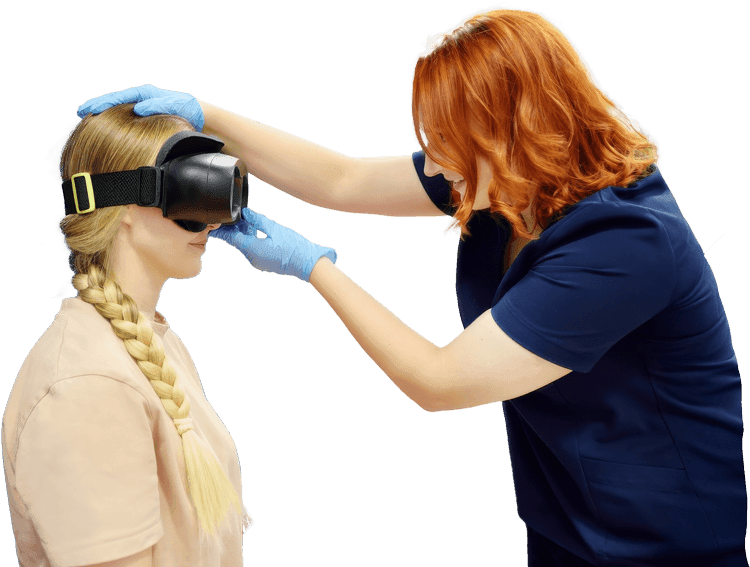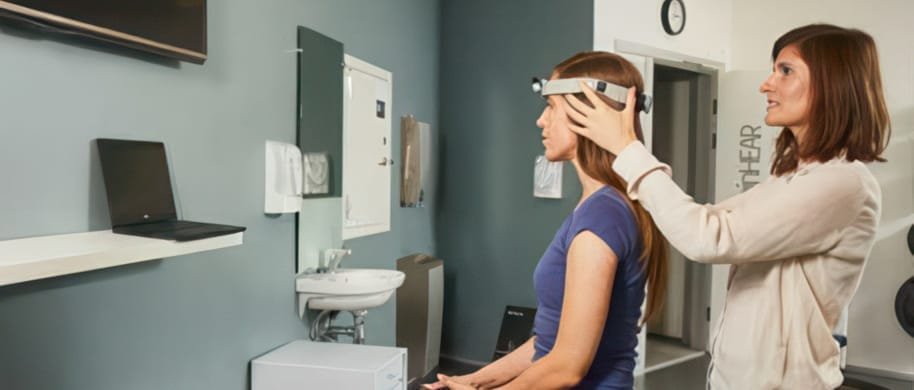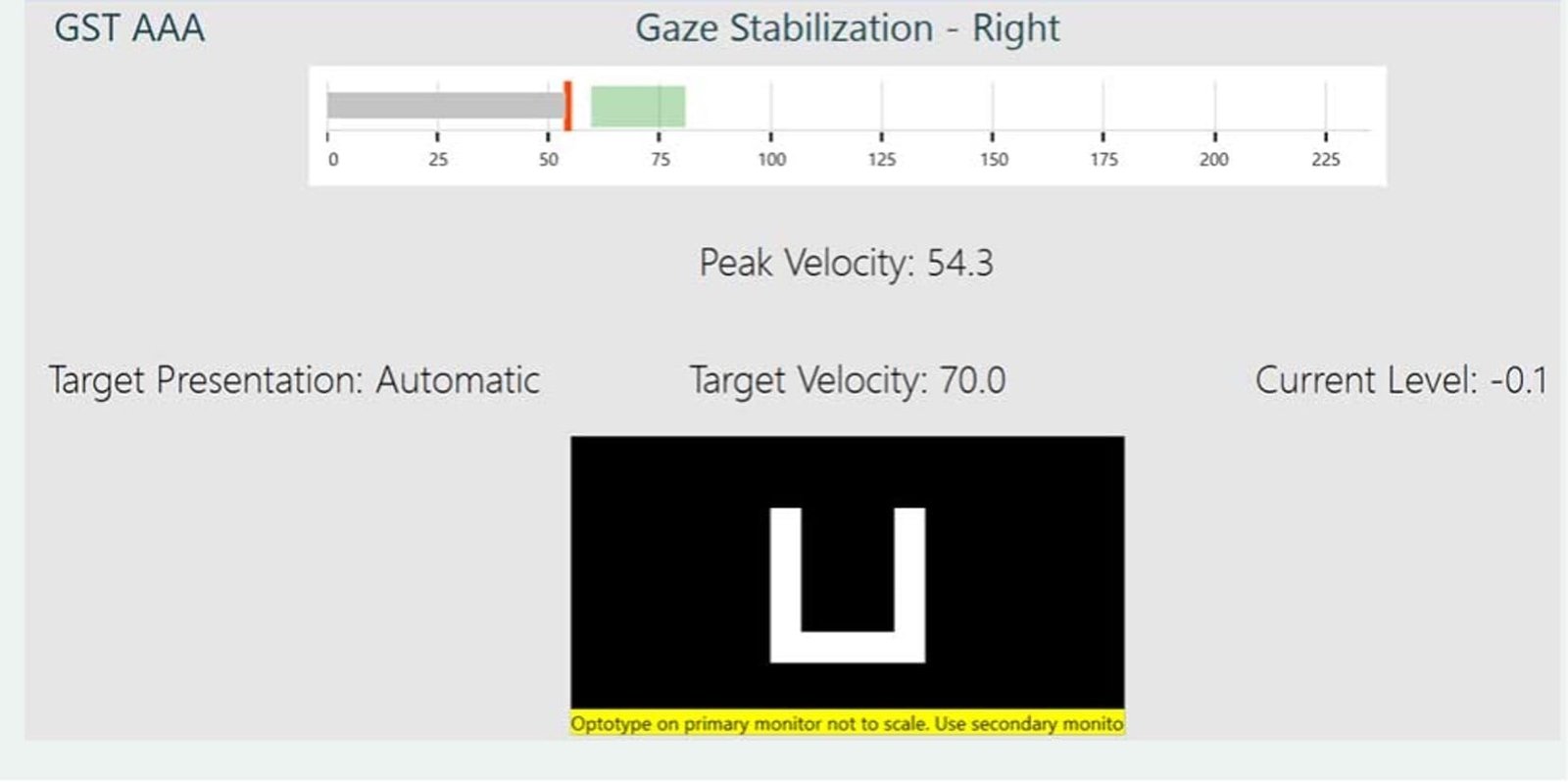Gaze Stabilization Test (GST)
The Gaze Stabilization Test (GST) is a diagnostic tool that evaluates the function of the vestibulo-ocular reflex (VOR) by assessing the ability to maintain clear vision on visual targets during head movements.

Discover the True Cause of Your Vertigo!
Understanding the source of dizziness and problems with your balance is the first step towards the right treatment. Book your appointment for an individualized assessment with our team of experts and regain your health.
The GST measures the vestibular system’s capacity to keep the eyes fixed on a point while the head is in motion. This test is specifically designed to assess the functionality of the VOR, a fundamental reflex of the vestibular system that allows the eyes to stay focused on a target even when the head moves. By evaluating how well the eyes remain fixed on a target during head movement, the GST helps determine if the vestibular system is functioning correctly.

How is the Gaze Stabilization Test Performed?
The test typically involves the following steps:
- Head Movements:
The patient is instructed to move their head in specific directions and at certain speeds (typically horizontal or vertical). It is crucial that the head movements are controlled and maintain a specific speed. - Fixation of the Eyes:
While moving their head, the patient is asked to keep their eyes fixed on a designated target (e.g., a static point or letter on a screen). - Evaluation of Focus:
During the test, the ability of the eyes to remain focused on the target—both in terms of duration and accuracy—is observed. If the eyes cannot stay fixed on the target or if focus is lost during head movements, it may indicate a vestibular system dysfunction.
Importance of the Gaze Stabilization Test in Vestibular Evaluation
A properly functioning vestibular system is essential for maintaining visual stability during movement. If the eyes cannot stay focused on a target during head motion, it may signify a VOR dysfunction. VOR impairment can manifest in symptoms such as:
- Blurred Vision: Blurriness, especially when the head is in motion.
- Dizziness and Imbalance: A sense of loss of balance due to the inability to stabilize vision.
- Worsening Symptoms with Head Movements: Rapid head movements may intensify dizziness, nausea, or imbalance.
The GST is a critical diagnostic tool for investigating the cause of these symptoms and evaluating the performance of the vestibular system’s VOR.

Conditions Commonly Assessed with GST
- Vestibular Neuritis: Inflammation of the vestibular nerve may impair the ability of the eyes to remain fixed.
- Labyrinthitis: Inner ear inflammation may negatively affect the vestibular system’s eye fixation capability.
- Bilateral Vestibular Hypofunction: Reduced vestibular function in both ears can weaken the VOR.
Treatment Planning Based on GST Results
Abnormal findings in the gaze stabilization test may indicate the need for vestibular rehabilitation. Such rehabilitation programs aim to restore visual fixation during head movements and strengthen the VOR. Through exercises involving head movements and visual focus, these programs help retrain the VOR.
Conclusion
The gaze stabilization test plays a vital role in assessing the vestibular system’s capacity to stabilize the eyes during head movements, contributing to the evaluation of VOR function. This assessment is crucial for diagnosing vestibular disorders and planning effective treatment strategies.
I have been having serious difficulties breathing for a long time due to nasal congestion. My nasal passages were almost completely blocked. As a result of my detailed research, Prof. Dr. I had the opportunity to meet Mehmet Deniz Yılmaz. From the first examination, his professionalism, knowledge and sincere approach gave me great confidence. My surgery was extremely successful. The discomforts I experienced due to polyps have completely disappeared. I can breathe easily now. I cannot thank the doctor and his team enough. I would like to thank each and every one of them for their care and attention during this process.Prof. Dr. I recommend Mehmet Deniz Yılmaz and his team wholeheartedly.Thank you, dear Doctor. Thank you very much 🙏🏻
When it comes to the teacher, he is the best in Antalya. How many places have I been to, how many doctors have I seen, what have I suffered over the years? Many doctors in Ankara, Istanbul, Antalya, none of them could even provide relief. May God bless my teacher Mustafa. We found him on the ground while looking for him in the sky. I recommend him to everyone with Meniere's disease.
My wife had apnea and snoring problems. Before Mustafa, other doctors said that about 5 different surgeries would need to be performed. We were worried and searched for another doctor. Looking at the comments here, we trusted Mustafa Hodja. Thank God, he said about 3 months ago that only closed nose surgery would be enough, and over time, the apnea would go away on its own. The surgery lasted 2.5 hours. My wife was discharged in the evening. There was no bruise or swelling on her face. She recovered within a week and returned to work. Meanwhile, his snoring decreased significantly and his apnea disappeared. Well done to our teacher. He is a very professional doctor and we recommend him to everyone.
My 2.5-year-old daughter could not breathe and her sleep was interrupted due to her adenoid problem. It was resolved in about 1 hour. Even right after the surgery, he started breathing very easily. Thank you so much, I'm glad to have you
We would like to thank our doctor and thank Ms. Ayşegül for her support before and after the surgery. I wish you a healthy day.
My teacher Mustafa came across it while researching on the internet. I had a unilateral parotid tumor, the other doctors I went to scared me so much, that's why I was avoiding surgery for two years. I read the comments of my teacher Mustafa and the fact that he operated on a patient like me made me more comfortable. I had surgery on March 7. I am very glad that I met my teacher Mustafa and came across him. May God bless him, I recommend him to everyone.
As a result of the hearing test performed at a Private Hospital I went to, I was told that I had hearing loss due to arthritis in my ear and that I needed to use a hearing aid. When I asked if there was another treatment for this, the answer given was that the only solution was hearing aids. This result did not satisfy me, so I wanted to research the best ENT Doctor in Antalya on the internet. The first name I came across was Prof. Dr. Mustafa Deniz Yılmaz was my teacher. As a result of our preliminary meeting with him and professional hearing tests, he stated that I would regain my hearing with the Otosclerosis Surgery he would perform without using a device. As a result of the trust given by my doctor, I decided to have surgery. My surgery went very well, my quality of life improved because I can hear very well now. I would like to thank my esteemed teacher and his valuable team for their interest and concern during this period. Definitely benefit from my valuable teacher's experiences, you will never regret it...
With hearing loss due to vertigo, I went to Mustafa Bey's clinic as a result of his advice and research on the internet. As a result of the treatment, I regained my hearing. Another hospital said that you will get a hearing aid and there is nothing to do after that. I would like to thank him very much from here. The staff is excellent, they are all smiling and kind people. I'm glad I came across this place. If you have such problems, be sure to go to Mr. Mustafa and his team without wasting your time looking for other places.
I am Ferah Emirdar, one side of my nostril was closed, I could hardly breathe, I was acting aggressively, the sinusitis I had been suffering from for years was a separate problem. When I went for the examination, I made my decision, I had the surgery, it was very successful and not what I feared. The first thing I said after removing the tampon was, "Are you breathing like this?" I became a calm person, my sleep improved, I fell asleep immediately, I had no nerves left because I slept well, and my sinusitis and nasal congestion were gone. I would like to thank your patience and team during this process. I am also happy to have met you.
I went to Mustafa Hodja with the recommendation of a friend, and after my examination, I had 2 parotid tumor surgeries, one month apart. Both surgeries were successful. I felt at ease each time with the explanations Mustafa Deniz Hodja made both before and after the surgery. Thanks to Mustafa Hodja's self-confidence and the intense interest of his assistants, I went through the surgery very comfortably. Thank you Mustafa Hodja and his friendly team.
I have been suffering from vertigo dizziness for 9 years. I was at a point where I could not do work at home. There was no doctor left that I did not go to. Finally, I went to my doctor, Mustafa Deniz. We started my treatment and I was very pleased with his care and attention. Now I am very well. I have been suffering from this dizziness for years. God bless you. I feel like I was born again. I am glad to have you, my teacher. I recognized
I am 34 years old. I have been having problems with infection and hearing loss due to ruptured eardrum since the age of 10. I wanted to have surgery and I went to many doctors. None of them were positive about me having surgery. They said my ears would not be healed with surgery. They recommended hearing aids. Upon the advice of a friend, I met Mustafa. He performed a very successful surgery. My hearing was cured. I got rid of the infection. Thank you very much for everything.
I am very happy with my teacher. He is a doctor who is very experienced in his job. His team is also knowledgeable. I think you should choose Mustafa without hesitation. I don't know any other doctor. I recommend him to everyone. He is a doctor who works hard, listens to his patient, and understands what he wants.
My quality of life has officially increased, I can breathe much easier. I would like to thank my teacher and his team very much.
We met with Mr. Mustafa Deniz for my son's adenoid surgery. He made me feel very comfortable with his interest and explanations. Our doctor is really a very sincere person. Our surgery was very successful, thank God. I had surgery a few months ago. I had a cyst in my throat. He explained my surgery process and my situation to me with the same interest and concern. My surgery went very well, thank God. Mr. Mustafa Deniz is successful in his job, valuable and a good person. The people who work with them are very valuable and good people. I'm glad I met you 🙂
I had nose surgery. I am in my 4th month. I am very satisfied. Thank you to my teacher Deniz.
I found Mustafa as a result of my research and went to him with the complaint of the Eustachian tube not being ventilated and hearing loss. I had had ear surgery many times before, so he looked at my nose and said that there was a curvature in the nasal bone and there was a serious devaluation. If we correct it, it would benefit the ear and help me breathe in the future. We decided to have the surgery. Now I am breathing air and my hearing has improved a little. He said I will be better. May God bless him. His communication and friendliness were very good. I am so glad to have you, doctor.
Hello, I have had a Vertigo disorder that has not gone away for three years. I reached out to our esteemed teacher Mustafa Deniz upon his advice. Thanks to the medications he gave as a result of the maneuvers and examinations he made, I have not had any dizziness for 4 months. Thank you very much to our esteemed teacher and his teammates, I am glad to have you, best regards.
I went to the doctor with a complaint of symptom perforation. He said that he could easily close it after the examination. I had my surgery in April 2024. He also performed deviation and nose tip aesthetics. My priority was, of course, to repair the perforation. Thank God, the hole closed and I also had a beautiful nose. My recovery process is still ongoing, it was a long and difficult surgery, but I can breathe healthy. During this process, Ms. Ayşegül was always just a phone call away. I also thank him very much for his interest.
If you are reading this article right now, you are in search of information like us. For this reason, I will tell you our story in some detail so that maybe it will be of some help to you. My daughter is 3 years old, we take her to our pediatrician regularly and when necessary. Our adventure started with nasal congestion. I am talking about a congestion that does not go away even though we constantly open it. Then, mouth opening and snoring. When we asked about this to our pediatrician, he directed us to Mustafa Hodja. After the examination of the size of the adenoid. He said it was 90%. We heard the sentence we didn't want: 'There must be surgery.' You'll be right, as a mother, I didn't want to have a child at a young age undergo surgery. I even shared the situation with my pediatrician. He said, 'If Mustafa Hodja says, get it done, he doesn't say it easily. We made an appointment immediately and two days later, my baby had the surgery. The only thing that was difficult about this surgery was waiting outside while your child was inside. Apart from that, everything was very planned and professional. The evening we came home, my little one stopped snoring. He slept and we were incredibly surprised by this situation. We did not experience any negative situation. I would like to express our endless gratitude to Mustafa Hodja once again. Ms. Ayşegül, who did the programming, guided us very well. I am glad our paths crossed. Sleep without snoring, may the children be happy❤️
Septal perforation Due to a nose surgery I had years ago, there were 2 huge holes and no cartilage was left in my nose. I could breathe very hard because all the cartilage in my nose had been worn away. I did a lot of research and consulted many doctors. They said that it was a very risky surgery and we could not do it. I tried very hard and researched a lot. Finally, I met Mustafa Deniz Yılmaz. I found his clinic and went to be examined. He said that it was a risky surgery, but he said he could do it. In fact, I had some fears, but after the examination, he made me overcome that fear. I had plastic surgery, it took about 11 hours, it took 4 months, I got perfect results, the holes in my nose are closed, with the cartilage taken from the rib, my nose is more beautiful than before, I can breathe very easily, thank you very much to my teacher Mustafa, he is a very good teacher, I think he is the best in this field.
I applied to my doctor with a complaint of septal perforation. I had surgery. It has been 5 months since my surgery and I am so relieved. I thank my doctor and his team very much.
Thanks to our doctor, I had a hole repaired in my nose in a very nice and painless way and regained my health very quickly. I would like to thank him again.
We came from Van to Antalya for my teacher Mustafa Deniz Yılmaz, he was very friendly and helped us a lot, he took care of us one on one. My surgery was very difficult. I was diagnosed with septal perforation (hole in the nose). Many doctors we went to said that this was difficult and there were only a few people who did it and referred us to my teacher Mustafa Deniz. He took very good care of me and performed my surgery successfully. Thank you very much to him and his team. I'm glad to have you.
Dear Sir, First of all, I would like to thank you. At first we used it for 5-6 hours, then I used it for 1.2 hours, no problem, thank you.
I took my mother, who was treated for vertigo in various hospitals for almost two months but could not get any results. As a result of detailed examination and tests performed by audiologists, Mustafa determined that she had balance nerve inflammation. The treatment, which was expected to last 4 weeks, was completed in almost 2 weeks with expert audiologists. Now her condition is very good and she returned to her normal life. Thank you to everyone who contributed 🙏🏻
First of all, I would like to express my endless gratitude to my marine instructor and all his staff. After a long wandering, I found my marine instructor upon his recommendation. He solved my dizziness problem that disrupted the entire routine of my life. May God bless you. REGARDS.
My daughter had adenoid surgery at the age of 6. Thank God, she is very well now. We chose my doctor because we trusted his knowledge and experience and we were not wrong. I recommend him as a doctor.
May God bless my doctor. He performed a septum perforation (intranasal hole closure) surgery in January 2023. Thanks to him, I can now breathe easily. No matter how many doctors I went to, he said that you should get used to living with a hole in the nose. He is one of the rare doctors who worked on this surgery and was successful. He performed the surgery, which lasted 9 hours, extremely successfully. I cannot pray and thank him enough.
I am a patient who underwent radical mastoidectomy surgery. For those who don't know, it is a serious discomfort for the ear. You need to go to a competent doctor. I'm glad I found my teacher. Our teacher's knowledge, approach to treatment and kindness towards the patient are tremendous. While most doctors were afraid to clean my ear, he gave me the good news that I could swim in the sea after years. As a patient, I felt safe from the first moment. You can entrust yourself with peace of mind. Sir, I'm glad to have you...
As a physician, I was examined by my teacher. I was back and forth between neurology and ENT for months. My teacher sincerely answered the questions I had in my mind, both through clinical examination and advanced tests. You understand from the moment you enter his clinic that he is well-equipped and knowledgeable. I recommend it to everyone. Thanks
We crossed paths with our teacher because of the mucocele that appeared in my brother's mouth. We are in Istanbul, my brother works in Antalya. When one is abroad and experiences such problems, one feels such a deep need for a doctor one can trust that there is no way to describe this situation. First of all, we had a meeting with Ms. Ayşegül. He was so sincere and understanding that we felt cool. Our teacher Mustafa performed my brother's operation successfully. I would like to thank my teacher Mustafa and Ms. Ayşegül for all their support throughout the process. The existence of such doctors does not leave us helpless regarding diseases. May God bless you 🙏
Dear Professor Mustafa Bey, For many years, I had to have my ears cleaned every 5-6 weeks. I consulted many doctors in Europe, but no one could offer me an effective solution.However, you explained what my illness was and showed me the solutions. I sincerely thank you for the support you have provided me in this matter.
I was examined at Doctor Mustafa Deniz Yılmaz's clinic on August 26, 2024, with complaints such as tinnitus and inability to maintain balance. There was no clear diagnosis for the situation I was experiencing. With the doctor's brain diagnosis and the treatment we started, my tinnitus has decreased to 20% as of today. I am very happy that I am moving towards a solution on the fourth day of the two-month treatment. I owe a debt of gratitude…I am grateful for providing me with the comfort of sleeping soundly.
I went to Deniz Bey for vertigo. Thanks to Ms. Deliverye's tests, I was diagnosed correctly and I no longer have dizziness. Thank God, I can continue my life from where I left off, with the medicine given by Mr. Deniz and the exercise treatment by Ms. Deliverye. I am grateful to both of them.
I have been suffering from tinnitus for 35 years. Until I met Mustafa Denizi, I was diagnosed on March 27. Thanks to the medicine he gave me, I felt so relieved in a short time of 3 months that I almost lost my tinnitus and my dizziness. I would like to thank Hacamat and his staff.
Hello, last year, in August 2023, my voice suddenly became hoarse and it did not go away, so I visited 3 hospitals, showed it to the ENT and looked for a solution to my problem, but they could not find anything, then upon the advice of a doctor, Prof. Dr. I came to Mustafa Deniz Yılmaz, I'm glad I came. He saw that I had a cyst on my vocal cord and operated on me. Since the cyst was attached to my vocal cord, he could not remove the entire cyst. He sent it to the doctor and asked for a report. In that report, it was seen that there was a cancerous cell on the remaining cyst. So, thank you for the remaining part. He sent me to treatment. Today, in March 2024, I came for a check-up and he gave me the good news that I was completely healed. If I can speak without any problems today, I owe it to him, thank you very much.
My complaint, which started with earache, continued with severe dizziness and nausea and vomiting. This process took 40 days, I went to more than 10 doctors during this time and could not get a correct diagnosis. Various maneuvers and wrong treatments were applied, thinking it was either an infection or a crystal shift, and my recovery time was extended, but I didn't feel well or stand up even for a day. Mr. M.Deniz diagnosed Balance Nerve Inflammation (vestibular neuritis) with examination techniques that no one else had done. I returned to my old life through the rehabilitation process. I would like to thank each and every one of you, the Doctor, the Audiologist, the Secretary and the dear people who put up with me during my 7 months of pregnancy, who worked hard for my recovery, and who stood by me until the end with their knowledge, equipment and sincerity, even though I never believed that I could recover in the sessions. 😇
Hello, my son had cochlear implant surgery at the age of 6. Our surgery, which had many risks, was very successful. Mustafa teacher and his assistants were very attentive before and after the surgery. They did their best for my son and continue to do so. I thank them very much. I'm glad to have you, Mustafa D. Doctor and MDY Clinic team 🌺🤗❤️
Hello, I would like to thank our teacher MUSTAFA DENİZ, who performed tube follow-up adenoid surgery on my daughter Sine's ear when she was 4 years old, and now, at the age of 13, he also repaired the eardrum and brought my daughter back to health.
Hello, he saw the problem in my nose and throat, which had not been noticed for 2 months, and I returned to normal on the 3rd day... I would like to thank my teacher Mustafa.
Our mother had eardrum surgery 4 times before, and the disease recurred after a while in all of them. Then they recommended Mr. Mustafa, and we had the surgery done by him in one go. His attention was very good from the first day you went there, he was also very attentive after the surgery and now my mother's complaints have stopped. We thank him very much, we are glad we chose you. We wish you success…
My mother had a cough that did not go away for more than 20 years. It came in the form of cough attacks, lasted about 30-40 minutes, and affected her entire daily life. His voice was hoarse from coughing and he was feeling nauseous. It is not possible for me to express its severity in writing. Cough is a simple thing for a person who cannot see. For years, there was no doctor in Antalya or Ankara that we did not visit, they could not even diagnose us, let alone provide treatment. Still, many trial and error treatments were applied, but none of them even reduced his cough. As a result of my research, I found Mustafa Deniz Bey. As soon as he examined him, he made a diagnosis and started treatment. His treatment has been continuing regularly for 4 months and at this point, the cough has decreased by 80-90%. When he coughs, it is not in the form of attacks like before, but in the form of short-term cough, and his treatment is not over yet. After my mother has suffered for so many years, this seems enough for her. I cannot thank Doctor and his team enough. Fatma Hanım and Ayşegül Hanım are also very attentive, the whole team is the same, I'm sorry I can't write them one by one because I don't know their names. 😊 Thank you very much to everyone, I hope people like my mother who have been looking for a cure for their problems for years will see this comment and find healing for them too.
My son was diagnosed with otosclerosis in 2018 and he started using hearing aids in both ears after that date. I decided to have surgery on my son, and as a result of my research, God brought my teacher Mustafa Deniz YILMAZ to us, we made our decision and got in touch. We were very pleased with the interest and care shown to us by both my teacher and his staff and teammates, from the moment you contacted us to the surgery, dressing, stitch removal and all kinds of communication during this period. May God be pleased with all of them, let's come to the surgery, your son had surgery, the first diagnosis made during the surgery was diagnosis and tympobaplasty, but my teacher Mustafa performed a miracle and re-established a hearing system in my son's ear, without using any foreign objects (prosthesis, etc.) 100% success as a result of the hearing test. I hope to have the surgery on his left ear this year. God bless my teacher Mustafa and his team, they laughed with us and got emotional. They cried, what more can one expect from a doctor? Thank you sir.
I would like to thank our teacher Mr. Mustafa and his colleagues for their interest and concern. They did a great job. I became a brand new me.
I was a dizziness patient who had been diagnosed with Vertigo for a long time but could not find a cure. I reached out to the doctor by following his Instagram. As a result of the tests and examination he applied, he said that I was a vertebral migraine patient. My medications were very good. I have not been dizzy for 3 months. I am grateful to him. He saved me from a very difficult period. I recommend this center to all Vertigo patients who could not find a cure. Thank you.
Fill out the form and
we will call you
Discover the True Cause of Your Vertigo!
Understanding the source of dizziness and problems with your balance is the first step towards the right treatment. Book your appointment for an individualized assessment with our team of experts and regain your health.














































